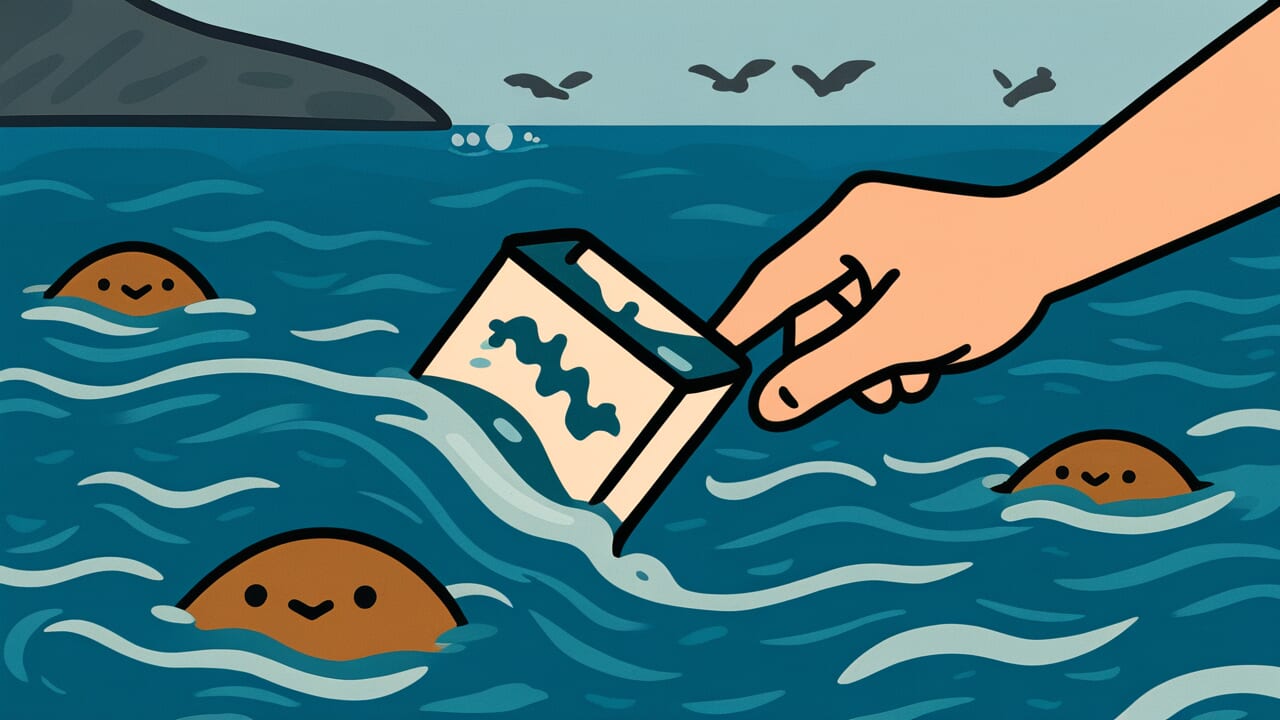How to Read “The great ocean does not choose refuse”
Taikai wa akuta wo erabazu
Meaning of “The great ocean does not choose refuse”
This proverb means that excellent people don’t fuss over small things and have great capacity.
Just as the vast ocean accepts even tiny pieces of trash without refusing them, truly big-hearted people can accept others as they are.
They don’t worry about minor flaws or mistakes.
People use this saying to describe the ideal attitude of leaders and those in authority.
It’s quoted when praising someone who doesn’t blame subordinates for small mistakes and accepts diverse opinions and personalities.
It’s also used when reminding yourself to be more tolerant.
In today’s world, the meaning of this proverb has become even more important as society values diversity.
This saying teaches us not to demand perfection but to recognize and accept each person’s differences and weaknesses.
Origin and Etymology
This proverb is believed to come from ancient Chinese classics.
“Taikai” means the vast ocean, and “akuta” refers to small trash or dust.
The wide ocean accepts even the smallest trash without refusing it.
This image expresses the great capacity of excellent people.
Ancient Chinese philosophical texts describe how great rivers and oceans maintain their greatness by accepting all small streams without choosing.
This philosophy came to Japan and became established as a proverb expressing a person’s capacity.
What’s particularly interesting is the idea of overlapping natural phenomena with human virtue.
The actual ocean accepts water and various materials flowing in from rivers without discrimination.
As a result, the ocean continues to maintain its vastness.
This proverb’s deep insight lies in overlapping this natural principle with the ideal leader in human society.
Since ancient times, East Asia has had a tradition of viewing “water” as a symbol of virtue.
Water flows to low places, adapts to any shape, and accepts everything.
This proverb also presents the virtue of water as a human ideal.
Usage Examples
- Our new department head embodies the spirit of “the great ocean does not choose refuse” and listens to everyone’s opinions
- It’s because of her personality like “the great ocean does not choose refuse” that she can bring together such diverse members
Universal Wisdom
Why do people get hung up on small things?
We notice others’ flaws, get upset over tiny differences, and try to exclude opinions different from our own.
This might be a human instinctive defense reaction.
However, this proverb has been passed down for so long because our ancestors understood a truth.
Such narrow-mindedness actually makes us smaller.
The vast ocean remains an ocean because it accepts everything.
If the ocean were picky, saying “this water is dirty” or “I don’t like this current,” it would stop being an ocean.
The same applies to humans.
The capacity to accept others is what truly makes a person great.
What’s interesting is that accepting others differs from losing yourself.
The ocean accepts everything but doesn’t stop being an ocean.
Rather, by accepting, the ocean becomes richer.
Humans too become deeper and broader by accepting others.
This proverb teaches that tolerance is not weakness but the strongest power.
The mental space to not fuss over small things truly makes a person great and becomes a charm that attracts many people.
This is the timeless essence of human relationships.
When AI Hears This
When we view the ocean accepting refuse through physics, a surprising fact emerges.
Entropy is an indicator showing “the degree of disorder,” and every closed system in the universe necessarily moves toward high entropy.
In other words, toward a more mixed state.
What’s important here is that trying to reject refuse actually requires enormous energy.
For example, for water to selectively exclude only certain substances requires filter functions or selective chemical reactions.
This is an act of maintaining a low entropy state.
This act, which goes against the second law of thermodynamics, cannot be realized without continuously injecting energy from outside.
On the other hand, the state where the ocean accepts everything is a high entropy state where matter naturally diffuses and mixes uniformly.
This is the direction the universe spontaneously moves toward, with zero energy cost.
In other words, the act of “not choosing” is the easiest state aligned with physical laws.
The reason we’re taught to “be tolerant” in human society might actually lie here.
The act of selecting and excluding others demands high costs both biologically and socially.
The brain consumes energy, organizations become divided, and maintenance requires effort.
Accepting is actually more stable for the system as a whole.
Physical laws align with moral teachings.
Lessons for Today
Modern society has a strong tendency to demand perfection.
On social media, people’s small verbal slips cause firestorms, and at work, minor mistakes are sometimes excessively blamed.
However, this proverb shows us a different path.
If you’re in a position above others, try focusing on your subordinates’ potential rather than their small flaws.
No one is perfect.
Rather, by accepting people with diverse personalities and ways of thinking, the entire team becomes richer.
The same applies to personal relationships.
You might get irritated by friends’ or family members’ minor habits or failures.
But if you keep fixating on those small things, you might lose the important relationship itself.
What’s important isn’t forgiving everything.
It’s having the eye to distinguish what’s essentially important from what’s not.
Don’t get swept up in small things, and direct your heart toward what’s truly important.
By doing so, your own heart should become broader and calmer.
Great capacity isn’t an inborn talent but something you can cultivate through daily choices.



Comments